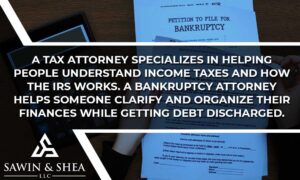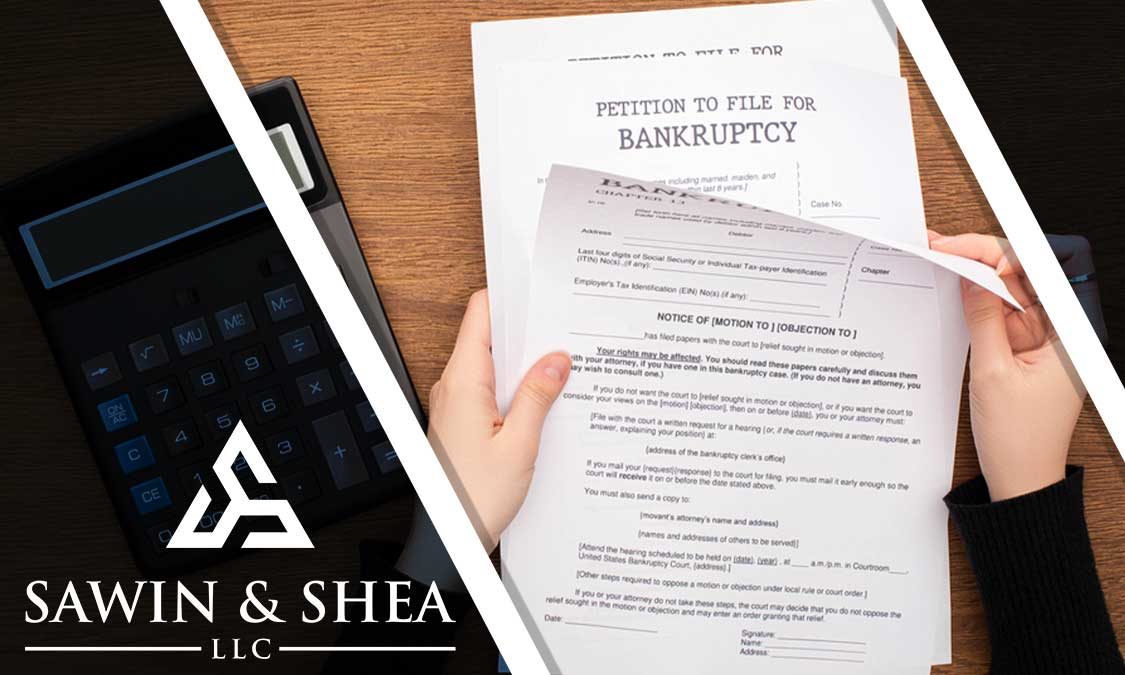When you have bills piling up and you’re dealing with notices from the Internal Revenue Service (IRS), it’s time to contact an attorney to learn more about your options. You may be wondering whether you should opt for a tax attorney or a bankruptcy attorney.
This page addresses the most common questions about selecting the right attorney to help you address your tax problems and other financial concerns. Choosing the right solution is a big step that could affect your life for years to come.
If you’re worried about garnishments, foreclosures, lawsuits, repossessions, or other consequences of your debt, connect with an experienced bankruptcy lawyer at Sawin & Shea as soon as possible. You deserve a fresh start.
What’s the Difference Between a Tax Attorney and a Bankruptcy Attorney?

A tax attorney specializes in helping people understand income taxes and how the IRS works. They typically answer questions from a debtor about back taxes, filing annual tax returns, and tax penalties they may owe.
A bankruptcy attorney helps someone clarify and organize their finances while getting most types of debt discharged. They usually assist people with pursuing the common routes of Chapter 7 bankruptcy or Chapter 13 bankruptcy to address tax debt. They’ll help you resolve your back taxes as part of a broader bankruptcy plan for your finances.
If you simply need help preparing your taxes, or if you have basic questions about your income taxes or tax debt, a tax specialist is your best bet. However, contact a bankruptcy lawyer if you have a complicated financial picture that may require significant financial reorganization.
Bankruptcy attorneys address other important debt-related issues, like paying income tax debt, resolving credit card debt, and stopping creditor harassment. They help their clients ensure most old debts are discharged and start a new plan for financial stability, in addition to satisfying the IRS.
Choosing a Bankruptcy Lawyer vs. a Tax Lawyer
A tax lawyer can help with most basic tax-related tasks like:
- Getting your income taxes paid, including late payment penalties
- Identifying tax fraud
- Resolving most tax debts
- Making regular payments on income tax debt
- Answering many basic taxpayer inquiries

Bankruptcy lawyers address more than just clients’ tax relief and debt issues. Working with a bankruptcy lawyer is about taking a broader look at your entire financial picture beyond taxes to apply a bankruptcy filing wisely.
- Understanding the bankruptcy code and related law
- Selecting Chapter 7 bankruptcy or Chapter 13 bankruptcy
- Sorting through certain tax debts you may or may not owe to creditors
- Identifying priority debts vs. non-priority debts
- Making a plan to clear out credit cards, medical bills, and other debts owed, including interest
- Addressing tax debt issues related to property and belongings
- Evaluating recent tax debts vs. old tax debts
- Protecting a debtor’s assets while filing for bankruptcy
- Ensuring a bankruptcy petition is properly filed through the bankruptcy court
Does My Bankruptcy Lawyer Need a Tax Background?
New laws and trends impact how people manage their finances. A bankruptcy lawyer with a tax background helps you get the most out of your tax debt relief and ensures filing bankruptcy runs as smoothly as possible.
IRS Issues and Dischargeable Debt
Bankruptcy involves analyzing your tax debt and determining what may be dischargeable. This includes determining what you owe, when you filed relevant returns, the dates of your assessments, and what interest and penalties may apply.
You’ll determine what’s dischargeable while keeping you in the good graces of the IRS. Your bankruptcy plan can be filed to pay back nondischargeable portions while still working to discharge as much tax debt as possible.
Handling Tax Debt and Refunds
Do you know how much of your tax refund you can keep when filing? Your lawyer should be able to give you a much clearer understanding of how your tax refund will be incorporated into the bankruptcy. Review your exemptions and withholding to see opportunities to keep the maximum within the law.
Protecting What You Own
Asset protection is always a concern when filing bankruptcy. If you have property, collections, investments, capital gains, or other valuable assets, ensure your attorney is fully qualified to address the range of your financial interests.
You may have questions about voluntarily or involuntarily surrendering real estate, for example. This can have a tax impact on your bankruptcy, so discuss your concerns with your lawyer.
Who Will Help Me Determine if My Debt is Dischargeable?
A bankruptcy attorney can help you determine if your tax debt is dischargeable. While a tax specialist is helpful in terms of helping you address specific concerns about your tax return, a bankruptcy attorney can move forward with bankruptcy and protect your assets while making a plan to hopefully discharge tax debt and other debts.
Factors in Determining Whether Debt is Dischargeable in Bankruptcy

How recent is the debt?
Did you already file a tax return related to this debt in the years prior to this one?
When was your IRS tax return filed and assessed?
Has a lien been filed on your property?
Do you have other debt, loans, discharged debts, or other amounts owed?
What paperwork have you received from the IRS about this debt?
Are you selecting Chapter 7 bankruptcy or Chapter 13 bankruptcy?
Can a Bankruptcy Lawyer Help Me Resolve Tax Debt?
If you’re finding it challenging to pay back taxes to the IRS, a tax attorney can provide insight into what the IRS is demanding and how people typically address the situation. A bankruptcy attorney can help you use the bankruptcy process to try and get rid of tax debt.
More Tax Attorney vs. Bankruptcy Attorney Questions? Ask Sawin & Shea
If you still have questions about resolving your tax debts, please contact the experienced bankruptcy team at the law office of Sawin & Shea, LLC. We offer a fast path to financial freedom.
Start your free consultation today by calling 317-759-1483.



